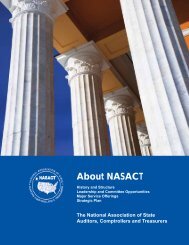Advisory Committee on Tax Exempt and Government Entities (ACT ...
Advisory Committee on Tax Exempt and Government Entities (ACT ...
Advisory Committee on Tax Exempt and Government Entities (ACT ...
You also want an ePaper? Increase the reach of your titles
YUMPU automatically turns print PDFs into web optimized ePapers that Google loves.
The Appropriate Role Of The Internal Revenue Service With Respect To <strong>Tax</strong>-<strong>Exempt</strong> Organizati<strong>on</strong> Good Governance Issuesevidence such as this may indicate that good governance in the end is a questi<strong>on</strong> of thevalues, active engagement, <strong>and</strong> accountability of those in charge, rather than theadopti<strong>on</strong> of specific practices or policies.Even if empirical evidence suggested that certain “best practices” were “best” forbusiness corporati<strong>on</strong>s, it is not at all clear that this would translate to n<strong>on</strong>profitcorporati<strong>on</strong>s. 46 One dramatic difference between business corporati<strong>on</strong>s <strong>and</strong> n<strong>on</strong>profitsis that the former has almost a singular purpose—the overarching purpose of businesscorporati<strong>on</strong>s is to promote the welfare of shareholders, specifically to maximizeshareholder value. The objective of corporate governance initiatives in this sector thenis to protect investors <strong>and</strong> promote fair <strong>and</strong> efficient markets that both encourageinvestors to provide capital <strong>and</strong> protect investors who do so. For example, suchinitiatives endeavor to protect shareholders from attempts by management to benefititself to the detriment of shareholders, to prevent insiders from trading <strong>on</strong> n<strong>on</strong>-publicinformati<strong>on</strong>, <strong>and</strong> to require timely public release of accurate financial informati<strong>on</strong> thatinvestors should have in determining whether to buy, sell, or hold securities. But evenwith that more limited <strong>and</strong> approachable st<strong>and</strong>ard, the empirical data either fails tosupport or is inc<strong>on</strong>clusive or c<strong>on</strong>troversial with respect to the efficacy of many “goodgovernance practices” in the for-profit setting. The purposes of n<strong>on</strong>profit organizati<strong>on</strong>sare more diverse <strong>and</strong> complicated <strong>and</strong>, c<strong>on</strong>comitantly, the roles of their boards arebroader <strong>and</strong> more nuanced than in the for-profit sector. This diversity <strong>and</strong> complexity inthe n<strong>on</strong>profit sector may suggest that specific good governance practices are even lesslikely to be effective in the n<strong>on</strong>profit c<strong>on</strong>text.VI. REGULATION AND SELF-REGULATION OF NONPROFIT GOVERNANCEOUTSIDE OF THE IRSA. Introducti<strong>on</strong>One of the issues that arises is whether there is a need for the IRS to be more involvedin n<strong>on</strong>profit governance bey<strong>on</strong>d the specific statutory requirements in the tax laws.N<strong>on</strong>profit organizati<strong>on</strong>s can be regulated by many—<strong>and</strong> sometimes c<strong>on</strong>flicting—authorities. Because n<strong>on</strong>profit organizati<strong>on</strong>s are established under state law, stateshistorically have had the principal resp<strong>on</strong>sibility <strong>and</strong> greatest authority to regulate in thearea. Organizati<strong>on</strong>s with offices in more than <strong>on</strong>e state or that solicit c<strong>on</strong>tributi<strong>on</strong>s inmultiple jurisdicti<strong>on</strong>s may be subject to the laws of a number of states. There also areindustry-specific accreditati<strong>on</strong> agencies, st<strong>and</strong>ards relating to participati<strong>on</strong> in particularOversight of the related-party transacti<strong>on</strong>s by Enr<strong>on</strong>’s Board of Directors <strong>and</strong> Management failed for many reas<strong>on</strong>s. As athreshold matter, in our opini<strong>on</strong> the very c<strong>on</strong>cept of related-party transacti<strong>on</strong>s of this magnitude with the CFO was flawed.The Board put many c<strong>on</strong>trols in place, but the c<strong>on</strong>trols were not adequate, <strong>and</strong> they were not adequately implemented.Some senior members of Management did not exercise sufficient oversight, <strong>and</strong> did not resp<strong>on</strong>d adequately when issuesarose that required a vigorous resp<strong>on</strong>se. The Board assigned the Audit <strong>and</strong> Compliance <str<strong>on</strong>g>Committee</str<strong>on</strong>g> an exp<strong>and</strong>ed duty toreview the transacti<strong>on</strong>s, but the <str<strong>on</strong>g>Committee</str<strong>on</strong>g> carried out the reviews <strong>on</strong>ly in a cursory way. The Board of Directors wasdenied important informati<strong>on</strong> that might have led it to take acti<strong>on</strong>, but the Board also did not fully appreciate thesignificance of some of the specific informati<strong>on</strong> that came before it. Enr<strong>on</strong>’s outside auditors supposedly examinedEnr<strong>on</strong>’s internal c<strong>on</strong>trols, but did not identify or bring to the Audit <str<strong>on</strong>g>Committee</str<strong>on</strong>g>’s attenti<strong>on</strong> the inadequacies in theirimplementati<strong>on</strong>.46See Dana Brakman Reiser, Enr<strong>on</strong>.org: Why Sarbanes-Oxley Will Not Ensure Comprehensive N<strong>on</strong>profit Accountability, 38 U.C.Davis L. Rev. 205 (2004).ADVISORY COMMITTEE ON TAX EXEMPT AND GOVERNMENT ENTITIES (<strong>ACT</strong>) June 11, 2008 17













